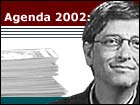
NEW YORK (CNN/Money) -
The numbers at Microsoft are headed in the wrong direction. This is not a fact most investors have focused on, but plenty of the company's executives have. At Microsoft's sprawling Redmond, Wash. complex, the word "slowdown" is being openly discussed, casting a chill over the world's largest software company.
Revenue growth has slowed. Margins have narrowed. Until its fiscal 2000, the company had never posted annual operating income gains in the single digits. Now that's happened 2 years in a row.
While some of Microsoft's slide can be attributed to the recession, there is clearly something more fundamental at work. The company averaged 30.5 percent annual sales growth and 37 percent annual earnings growth over the past decade, but many Wall Street analysts now predict growth no better than the low to mid-teens for the foreseeable future.
Not surprisingly, Microsoft's stock has headed south: Since January 2000, while the S&P 500 has declined 23 percent, the once impregnable MSFT has fallen 49.3 percent.
| |
 Also in this package...
Also in this package...
| |
| | |
| | |
|
But there is one number that Bill Gates & Co. can point to that is heading inexorably upward: the amount of cash Microsoft has on hand. Thanks to its dominant, near-monopolistic position in what may be the best business on the planet -- system software for personal computers -- Microsoft continues to generate huge amounts of free cash flow.
At the end of last year, according to the company's most recent filings, its cash (and short-term investments that can be converted to cash in less than a year) totaled a whopping $38.2 billion. The Microsoft juggernaut continues to generate another $1 billion a month, putting the total cash today well above $40 billion.
This is a mind-bogglingly large pile of dough. No other nonfinancial firm has more liquid money at its disposal, and only a handful of banks do. It's more cash than Ford, ExxonMobil and Wal-Mart have combined, and nearly four times as much as Intel, the tech company with the next largest cash balance. It is enough to buy the entire airline industry -- twice. Or all the gold in Fort Knox, four times over. It is enough to buy 23 space shuttles or every major professional baseball, basketball, football and hockey team in America. It is an enviable stash. Who wouldn't love to have a bank account like that?
All that cash gives Microsoft a financial solidity and flexibility that most corporate managers would kill for. For investors in the post-Enron era, it also offers assurances that the company's business is very much for real.
For CEO Steve Ballmer, who ascended to the helm of Microsoft just as the company's growth began to flag, the cash is also a symbol of how Microsoft remains a company without peer: "Our core businesses, in terms of the revenue and income they generate...are absolutely phenomenal."
And yet there is also controversy about Microsoft's cash hoard -- complaints that perhaps it has grown too large. Observers as diverse as Ralph Nader and Merrill Lynch tech guru Steve Milunovich have called for the company to begin disbursing the cash to shareholders via a dividend. It is a move that the company has explicitly rejected.
One of the key roles of corporate management is to wisely reinvest whatever money the business generates to fuel ever-increasing profits. And with $40 billion to deploy, Microsoft is now arguably as much an investment firm as a software maker. (In fact, its cash stake is larger than the combined assets of the 9 biggest venture-capital firms in the U.S., larger than all but four of the country's equity mutual funds.) Yet Microsoft's cash seems to be just sitting there. Why would Microsoft, the ultimate growth company, allow so much money to pile up?
The answer to that question -- what is Microsoft doing with its cash? -- may be the most important single issue for investors in the company to get their arms around. That growing $40 billion hoard, as much as any other Microsoft statistic, indicates a fundamental shift at the heart of the company -- and a potential threat to the stock's premium valuation.
It also offers a road map to the Microsoft of the future. In short: If you want to understand where Microsoft is heading, you've got to follow the money.
To read about managing that $40 billion, click here.

|

